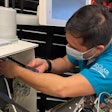Radiology and medical groups are welcoming the introduction of a bipartisan federal bill that aims to mitigate the impact of the finalized Medicare Physician Fee Schedule (MPFS) conversion factor reduction.
Lawmakers in the U.S. House of Representatives on October 29 introduced the Medicare Patient Access and Practice Stabilization Act. The bill would prevent the full 2.8% proposed cut to the Medicare physician conversion factor and provide a modest inflation update for 2025.
“Access to care could be at stake,” Dana Smetherman, MD, CEO of the American College of Radiology (ACR) told AuntMinnie.com. “[The bill] is something that we hope will stabilize Medicare payments to all clinicians, including radiologists.”
The Centers for Medicare & Medicaid Services (CMS) recently finalized the adjusted Medical Physician Fee Schedule (MPFS) that would decrease Medicare reimbursement for physician services by 2.8% beginning on January 1, 2025. However, the CMS also projects a 3.6% increase in practice cost expenses for 2025. Bill proponents said that this will equate to a 6.4% cut for physicians without Congressional action.
A report from the American Medical Association (AMA) suggests that Medicare reimbursements for physician services have declined by 29% between 2001 and 2024 when adjusted for inflation.
Advocates say that these reimbursement cuts will have consequences on rural and underserved areas and on access to more complex imaging services like MRI and PET/CT. They added that the cuts, along with rising wages and operational costs, will force physician practices to consider layoffs, reduced services, and office closures.
The Medical Group Management Association (MGMA) issued a statement in November supporting the bill, saying that in the future Congress must enact permanent reforms allowing for medical groups to keep offering their services and protect patient access to care.
“The fact that physicians must rely on Congress each year for a last-minute payment fix underscores just how broken the Medicare reimbursement system is,” the association stated.
James Haynes, associate director of government affairs at the MGMA, said that if Medicare continues this trajectory of continuous cuts to the conversion factor, patient health is at stake as practices contemplate selling equipment and closing shop.
“This would be a great first step, I would say, to averting these cuts and putting in an inflationary update that we believe needs to be there permanently moving forward so that medical groups can continue to serve their communities well and stay in business,” Haynes said.
“Obviously, any additional revenue is a boon for radiologists,” Sandy Coffta, vice president of client services at Healthcare Administrative Partners (HAP), told AuntMinnie.com. “Right now, it’s certainly not as much as we’d like to see.”
However, Coffta said the Medicare Patient Access and Practice Stabilization Act would provide a short-term fix that “hopefully” leads to a long-term solution. Hundreds of thousands of dollars could be at stake for larger practices, she added.
The bill has one thing going for it as it goes through the arduous legislative process; the bill was mostly introduced by medical doctors who now serve in Congress, collectively known as the Doctors Caucus.
Smetherman said this is important because these are people who know the ins and outs of medical practices. She added that the ACR frequently works with Congress in addressing issues such as the MPFS and introducing legislation.
“For radiologists, up to this point, our efforts have basically led to about $1.6 billion in reclaimed revenue for radiologists,” she told AuntMinnie.com. “I’m an optimist by nature. My hope is that Congress will understand, particularly with these individuals who are leading this effort, that the concerns will be understood and will be successful in getting this [stabilization act] passed.”
Coffta agreed, saying that the needs outlined in the bill can be communicated effectively and with bipartisan support.
Smetherman and Haynes in separate interviews added that the ACR and the MGMA will continue advocacy efforts, including reaching out to members and radiologists about these legislative efforts and working with Congressional members on the bill’s passage.
AuntMinnie.com · Medical groups welcome Medicare stabilization bill



















